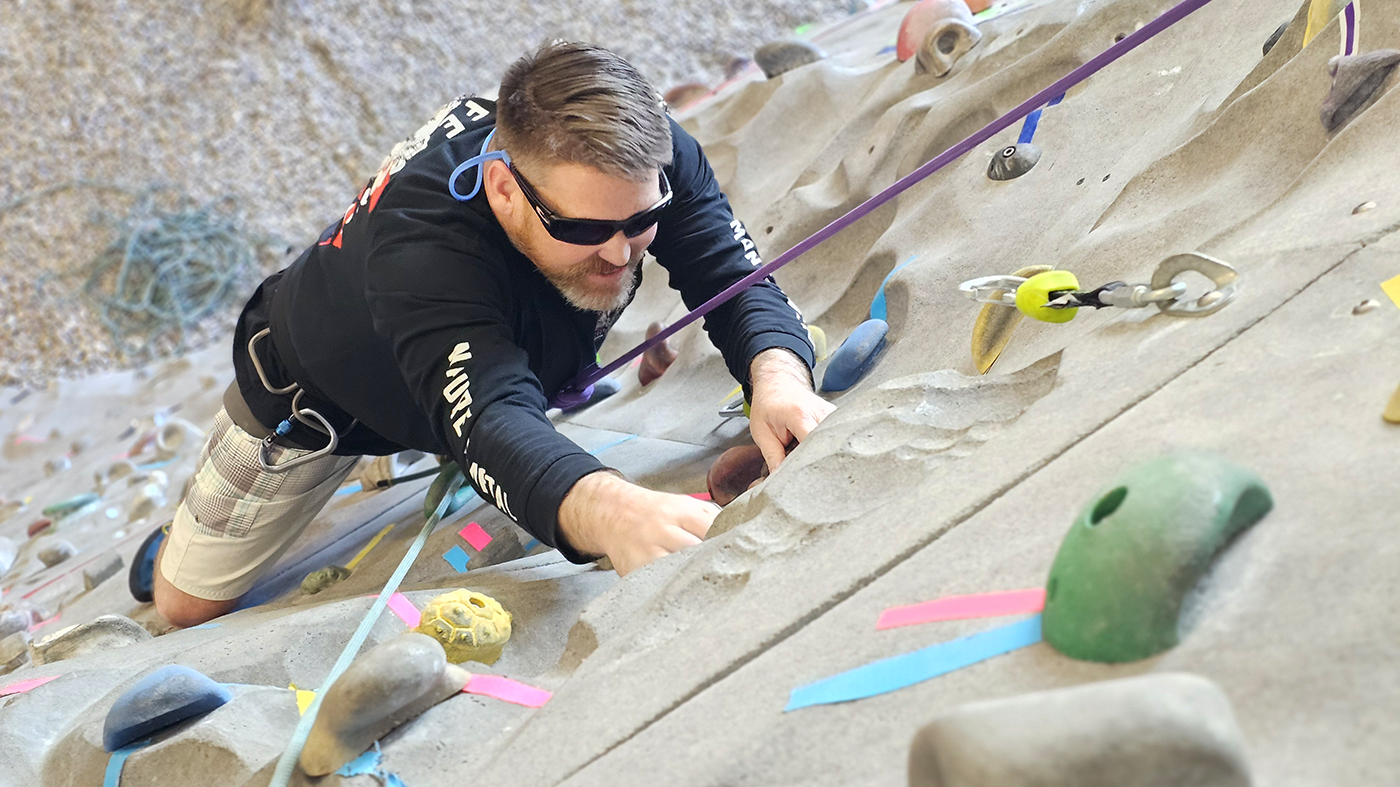At the Kalispell (MT) Vet Center, a unique and innovative approach to therapy is helping Veterans and service members scale new heights in more ways than one. By incorporating indoor rock climbing into their therapeutic modalities, the Vet Center team offers a dynamic and engaging way for individuals to overcome physical and emotional challenges, especially those associated with posttraumatic stress disorder (PTSD).
This hands-on activity not only promotes physical fitness but also fosters mental resilience, teamwork and self-confidence.
Brandon Pelfrey is a Navy Veteran and counselor at the Kalispell Vet Center who always enjoyed climbing and mountaineering in his spare time. After serving in the Navy, he spent time alone in the wilderness to process what he endured. As a marriage and family therapist, he wanted to share methods he hoped would help other Veterans and service members in processing their experiences.
Pelfrey’s curriculum builds on transferring the mental skills acquired in climbing and implementing them into daily life. After the climbing session, clients and their counselors discuss the experience on the rock wall and reflect on how they can apply this experience into their daily lives and relationships.
Counselor David Swenson works with Pelfrey at the Kalispell Vet Center and recalled one client for whom climbing therapy seems to have made a dramatic difference. The client is a Navy Veteran who suffers from PTSD from his military service and from his childhood. The climbing group helped rejuvenate his therapy by encouraging him to face several personal issues, and he is working through his struggles at a very rapid pace.
“I see someone with so much more ease and self-confidence over these last few months, and I don’t know if he would have gotten there without the group. If nothing else, he certainly wouldn’t be there for a while yet,” Swenson said.
Therapeutic approaches are not “one size fits all”
Counselors like Swenson and Pelfrey have the freedom to tailor therapeutic approaches to each individual’s unique needs rather than adhering to a rigid one-size-fits-all model. They believe this flexibility encourages innovation and adaptability, ensuring that both Vet Center teams and clients benefit from a holistic and personalized experience.
There are other advantages. “Running the climbing group in a public forum gives us the chance to make positive relationships with local community partners. It also draws a lot of attention, giving us the opportunity to invite other Veterans who may not normally engage in counseling services into the Vet Center. Veterans at the gym may have a conventional idea of what therapy is; this shows that therapy can be much more than that,” Pelfrey said.
About Vet Centers
Vet Centers offer a variety of counseling services to help Veterans, service members and their families make a successful transition from military to civilian life or heal after a traumatic event experienced in the military. Individual, group, marriage and family counseling are offered in addition to referrals and connection to other VA or community benefits and services.
There are 303 Vet Centers, numerous satellite locations and 84 Mobile Vet Centers offering services in all 50 states and U.S. territories.
Topics in this story
More Stories
VA delivers the care you have earned—whenever and wherever you need it.
Face it, muscle tension is not good for your health, but you can do something about it in 15 minutes!
For a group of Veterans at the Central Virginia VA Health Care System, Parkinson’s care includes a regular check-in to see what they’ve built with Legos.







I know the feeling of experiencing PTST when I returned to civilian after my 5th and last year in the Marine Corps. I had intended to make the Marine Corps into a career until I went to VN. That year changed my mine, I grew up in the Marine Corps, it made me a thankful person, a respectful person and taught me a lot about myself. I would have remained in the Corps but I did not want to return to VN for a second tour because I felt so fortunate to come back without being wounded. My first cousin, also a Marine was wounded 3 times in the 77 Day Siege of Khe Sahn. Later, I decided I wanted to climb a mountain. The first one I climbed was Kilimanjaro and I felt great when I reached the summit. On that first trip, the 4 of us, 3 guys and one female, climbed the Western Breach, Arrow Glacier from 16,000 feet to the summit. It wa probably the hardest thing I have ever done. We had a guide but we had to find hand holes in the dark with no flashlight, our water froze, our bars froze and we were NOT roped in. It took us 9 hours to reach a place near the summit and the female sustained cerebral edema and could not stand so I walked her down to 9000 feet and stayed with her until she recovered. I went back a few years later and climbed Kili again but this time on one of the routes to the summit and back. A group of us continue to clime to raise money for Prostate Cancer after a friend’s father passed away from Prostate Cancer. He had seen an article by a lady with breast cancer who wanted to climb Aconcagua in Chile. She was the only one to make the summit if I recall correctly on that all female climb and when she heard about our upcoming climb of Aconcagua, she sent us the banner she took to the summit. Personally, I think climbing mountains can be very cathartic and, it can be a way to help overcome many different adversities including PTSD. There are many mountains that can pose a challenge from an easy challenge to a major challenge. If I can assist in any program related to helping Vets from any branch, male or female, just let me know, be very happy to help.